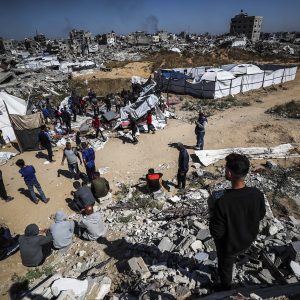Media ethics backslides in mainstream Gaza coverage as pro-Palestinian voices face barriers
LONDON (AA) – While Israel’s supporters have been easily getting their message across on mainstream Western media, pro-Palestinian voices are only allowed to speak if they condemn the Oct. 7 attacks, says the head of a UK-based media monitoring group.
Media ethics has taken centerstage since the Oct. 7 attacks by Palestinian resistance group Hamas, with many criticizing mainstream media as Israeli officials and supporters continue to make controversial remarks on the catastrophic situation in Gaza, where the death toll has climbed to over 21,000.
The director of the Centre for Media Monitoring (CfMM), Rizwana Hamid, told Anadolu that much of the coverage on Gaza has been “problematic,” seemingly negating much of the progress that has been made for more fairness.
“All the work that we’ve done with editors, with journalists, with regulators, etc., to try and improve the coverage, it feels like all of our work has been undone and we’re starting from scratch because on a daily basis, we are seeing problematic articles and broadcast programs and news on reports,” she said of the work of the CfMM, a Muslim Council of Britain (MCB) project that watches mainstream media reporting of Islam and Muslims.
“What I would say about the coverage this time is that it’s almost taken us back years in terms of how bad the coverage has actually been,” she noted.
Touching on the problems in the coverage, she argued that the main issue was that of a lack of context of the conflict and the Oct. 7 attacks
“There is very little context given to the conflict between Israel-Palestine, the occupation of Israel, the settler issues that’s been there, the blockades that are there, the borders that were already controlled by Israel,” she said, adding: “The reader and the viewer and the audience were left with the impression that this was just a one-off attack that came out of the blue that had no context to it … Israel was then able to legitimately in their eyes, go and attack Gaza.”
– Thousands of Palestinian deaths not called a ‘massacre’ –
News outlets also tend to frame their reports in way that is “quite pro-Israeli,” said Hamid, pointing out that Israeli sources are generally seen as more reliable than Palestinian ones.
One example of this is the discussion surrounding Palestinian casualty figures, she noted, adding that death and injury counts provided by the Palestinian side and Gaza’s Health Ministry have been constantly called into question despite being verified by international institutions, including UN agencies.
British media outlets usually treat these figures as claims or allegations in their reporting and put a prefix of “Hamas-run” in front of Gaza’s Health Ministry, the primary body revealing casualty numbers.
This, according to Hamid, delegitimizes the ministry in the readers’ eye since Hamas is already “delegitimized as a terrorist group.”
“There’s then even a lessening of the actual impact because the numbers are so great, but you’re being told that you can’t believe these numbers,” she elaborated.
The CfMM has also taken note of “very emotive adjectives” used to describe the Oct. 7 attacks, such as “massacre,” “horrific,” “brutal,” and “atrocious.”
But the deaths of more than 21,000 Palestinians in Gaza have not been described as such by any mainstream media outlet in the UK.
“There’s the example of when Israelis are killed, the word ‘killed’ is used, and the person who’s doing the killing or the organization that’s doing is put at the beginning of the sentence.”
“So it will say, ‘Hamas killed 1,200 Israelis.’ But when it comes to Palestinians, it will be very ambiguous and it will say things like, ‘2,000 Palestinians died as a result of a bombing campaign’,” she explained.
The word “Israel” or “Israeli” or “the Israeli Defense Force” are not used, Hamid emphasized.
– Shifting narrative –
Hamid also stressed that there were “inconsistencies” in terms of which individuals were given platforms on the mainstream media to make their voices heard on the conflict, prioritizing Israeli spokespeople or pundits “without being challenged in terms of the narrative that they’re propagating.”
“Whereas when it comes to Palestinians or pro-Palestinian spokespeople, initially their ticket into actually entering the discussion is premised on them, first denouncing and condemning the Oct. 7 attacks, whereas pro-Israeli people are never asked to condemn the killing of thousands of Palestinians,” she added.
Hamid observed that in the initial weeks of the attacks on Gaza, Israel unquestionably had the advantage in the propaganda war, asserting its dominance across all media platforms. She opined that during this period some people seemed to be “in a trance and completely buying into the whole Israeli narrative in the beginning.”
But, the narrative is shifting, she observed, as social media plays a “very interesting role,” especially for younger audiences, now enabled to follow sources in Gaza directly.
“They’ve been hearing from Palestinians on the ground, as well as Israelis on the ground. So they’ve had far more direct access to what’s going on in Palestine, from the Palestinian victims’ point of view, and from Gazans who are living there.”












